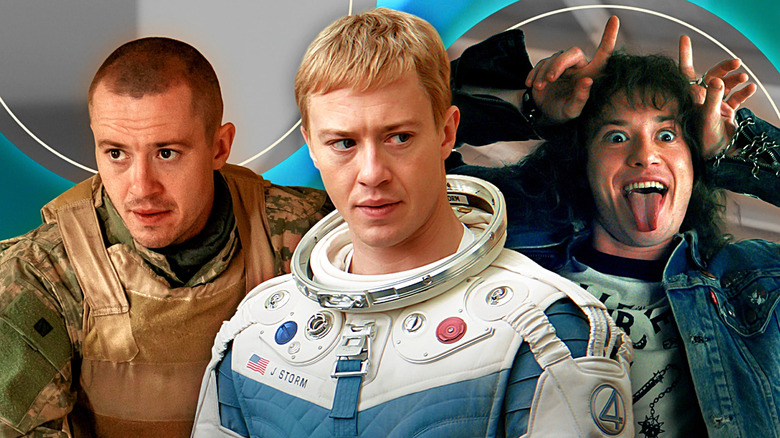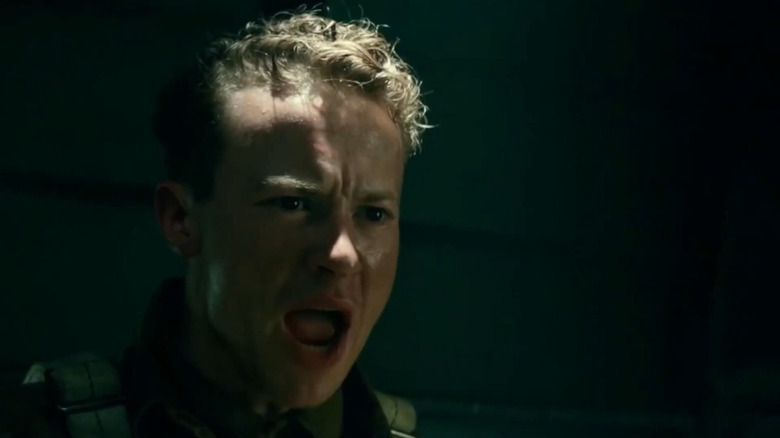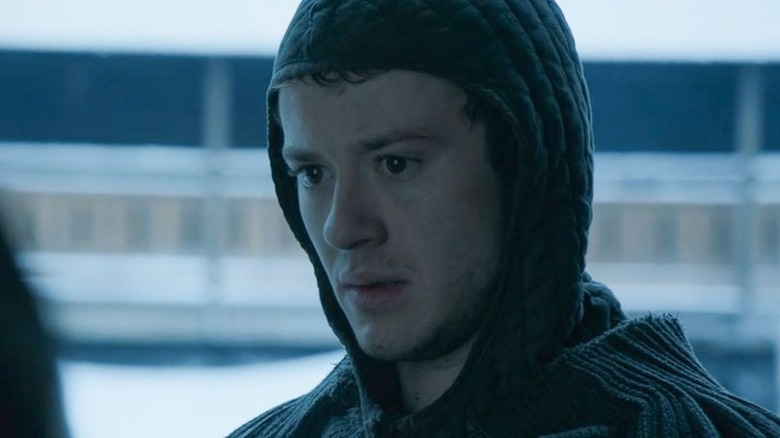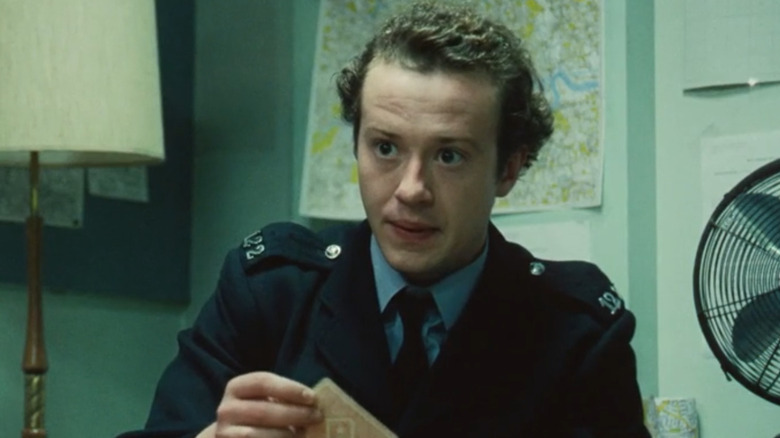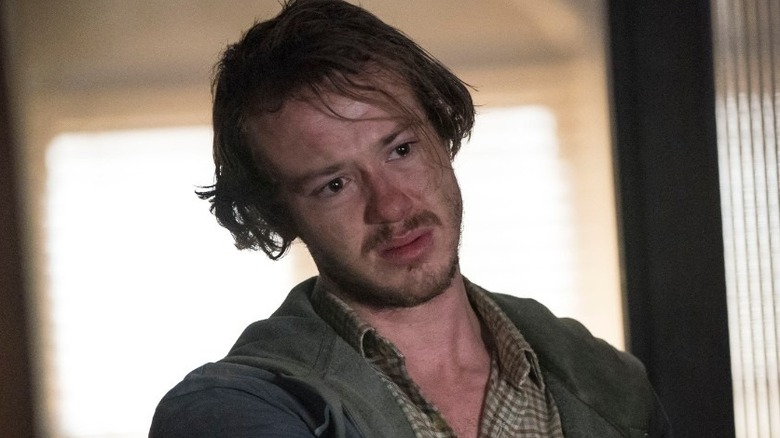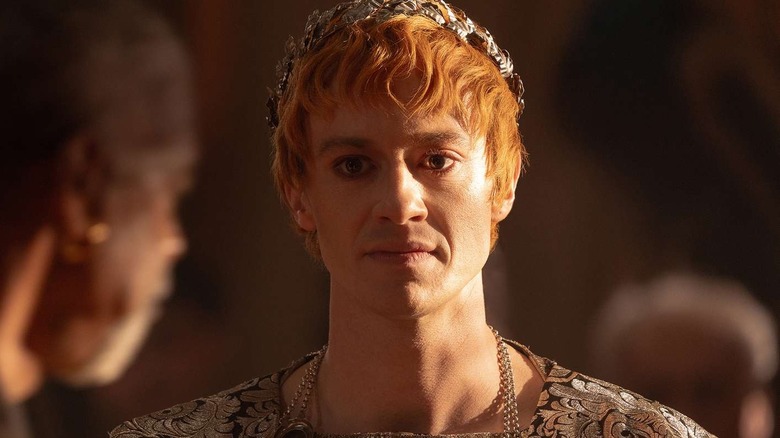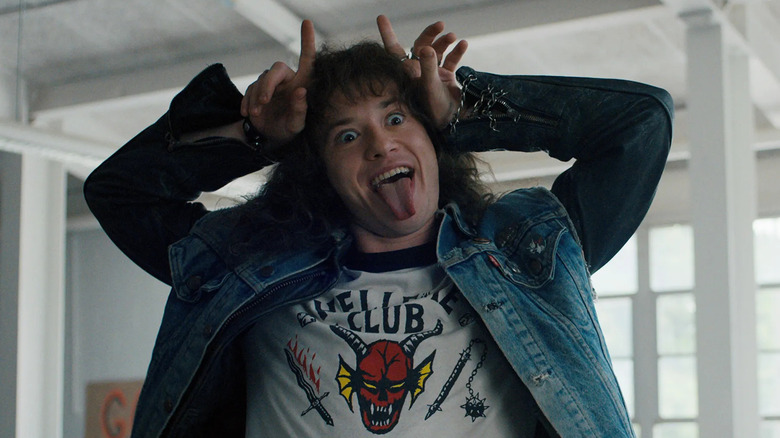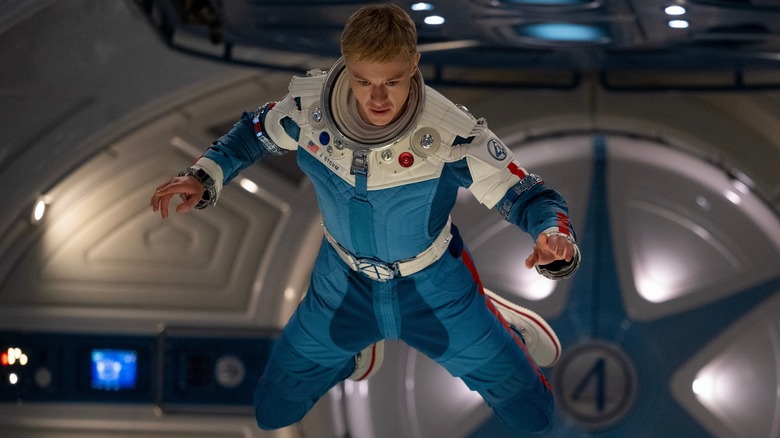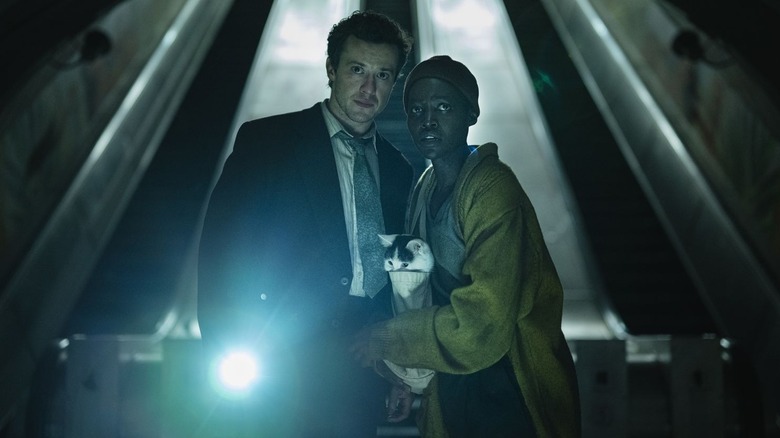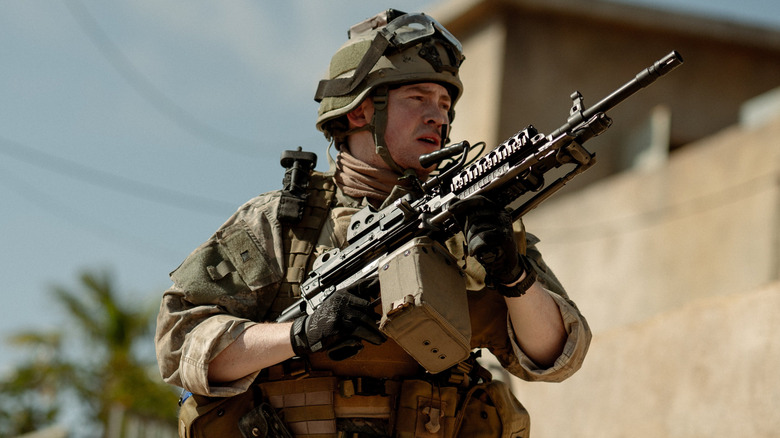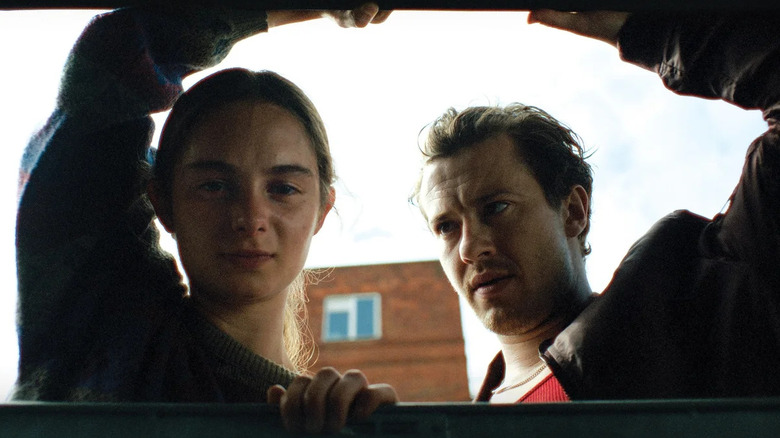10 Best Joseph Quinn Movies And TV Shows, Ranked
It's a fantastic time to be Joseph Quinn. Over a decade after he unsuccessfully threw his hat in the ring to play Peter Parker in "Spider-Man: Homecoming," the English actor is enjoying the fruits of a multi-year hot streak that began with a breakout performance as Eddie Munson in "Stranger Things 4" back in 2022. Both he and the character became something of a viral hit, making him one of the most in-demand young actors almost overnight.
Having previously played smaller, supporting roles in British television dramas that seldom made much noise in the states, Quinn was now being courted to star in major film franchises, including a highly-anticipated sequel to Ridley Scott's "Gladiator," a prequel to John Krasinski's blockbuster horror series "A Quiet Place," and, of course, "The Fantastic Four: First Steps," arguably the most coveted Marvel Studios project produced in years. Amidst these excellent, buzz-worthy performances, Quinn has also lent his talents to projects you may not have heard of — which just so happen to feature some of his best work so far.
Here are the best Joseph Quinn movies and TV shows to watch, ranked.
10. Overlord
Calling "Overlord" a Joseph Quinn movie is admittedly a stretch (and "Fantastic Four" fans should know a thing or two about stretching by now). But it's just too much of a hidden gem for us not to include as a milestone in his career.
Fans of superhero cinema will actually be particularly amused by the number of beloved faces showcased in the 2018 sleeper horror hit from across popular comic book projects. Alongside Quinn (who plays a soldier named Grunauer in the film's memorably vicious opening scene), "Overlord" features Bokeem Woodbine (Herman Schultz / The Shocker in "Spider-Man: Homecoming"), "Agents of S.H.I.E.L.D." star Ian De Caestecker, future U.S. Agent Wyatt Russell, and Jovan Adepo, a criminally underrated actor who has delivered story-stealing performances in "Fences," "Babylon," and, most notably, HBO's acclaimed "Watchmen" miniseries.
As for Quinn, you won't see too much of him in the movie, but don't let that stop you from taking a chance on this wild World War II monster mash. By the time you realize good ol' Grunauer isn't coming back for the curtain call, you'll probably already be too invested in "Overlord" to care.
9. Game of Thrones
At this point, you really don't need us to explain what "Game of Thrones" is. A global cultural phenomenon and perhaps the last bastion of must-watch TV, the HBO series ran for over ten years and eight mostly great seasons that were absolutely impossible to avoid for the near entirety of that time period. If you haven't seen it by now, you probably have no interest in ever watching it — and that's okay. However, if you count yourself among the uninterested yet consider yourself a fan of Joseph Quinn, you may want to check out season 7, episode 4, "The Spoils of War."
As even diehard "Thrones" fans might yet be unaware, Quinn actually had a small co-starring role on this episode, which aired all the way back in 2017. He played Koner, one of the two Northern soldiers stationed outside the gates of Winterfell (the ancestral home of the proud House Stark) when Arya Stark (Maisie Williams) meets the wall for the first time since season 1. Quinn acts alongside Danny Kiranne as Henk, who would go on to feature prominently in Netflix's "The Sandman" and "Baby Reindeer." "The Spoils of War" isn't an essential episode of "Game of Thrones" by any means, but it's worth watching to see Quinn at an earlier stage in his career — especially since it would mark the first collaboration between him and director Matt Shakman.
8. Small Axe
Joseph Quinn has played smaller supporting roles in several movies and television shows, but none quite as brilliant or necessary as Steve McQueen's limited anthology series "Small Axe." When it first premiered on BBC One and Amazon Prime Video in 2020, buzz was largely attributed to the episode (film, really) "Red, White and Blue," a devastating entry anchored by a career-best performance from John Boyega. As great as "Red, White and Blue" is, however, the other films released as part of "Small Axe" deserve equal praise — particularly, for our purposes, the premiere entry "Mangrove."
"Mangrove" is named after the real Caribbean restaurant founded in Notting Hill, London in 1968 by Frank Crichlow (played in the series by Shaun Parkes of "The Mummy Returns"). Having immigrated to the United Kingdom from Trinidad during a time of increased animosity and violence toward immigrants, Frank and his business are immediately subjected to aggressive, racially-motivated mistreatment at the hands of the corrupt local police force. Frank and his community — including Trinidadian scientist and Black Panther leader Altheia Jones-LeCointe (coincidentally played by "Black Panther" cast member Letitia Wright) — respond with a peaceful protest against the police's targeting of the restaurant, to which the police respond with outright violence.
"Mangrove" thus follows the fight for justice that Frank, Altheia, and other protestors face as law enforcement frames them as instigators with riotous intent. In the painfully relevant legal and social drama, Quinn plays PC Dixon, a new member of the police force who is quickly confronted with the flagrant racism of his new peers. He conveys an apparent discomfort that, when coupled with his inaction, elegantly portrays how even someone with Dixon's conscience upholds corruption.
7. Strike
The biggest drawback of "Strike" is, unfortunately and unavoidably, the true identity of "Robert Galbraith," the author of the books upon which the BBC detective series is based (and whose online presence is so boringly odious and transparently cynical that the idea of maintaining Galbraith as a separate cardboard cutout of an author becomes necessary to engage with the show at all). If you can put that fact aside — and, believe us, we'd sympathize if you can't be bothered to do so — "Strike" is actually a fairly decent show that, at its height, could be considered one of the best British TV crime dramas ever produced.
Tom Burke (best known for playing a major supporting role in the "Mad Max: Fury Road" prequel "Furiosa") stars as the titular detective Cormoran Blue Strike, a private investigator whose escapades are far more interesting than his hokey name might suggest. Each season of the series adapts one of "Galbraith's" novels, with season 4 tackling "Lethal White." On the cusp of the breakout role that would catapult him to mainstream stardom in a couple of years, Joseph Quinn recurs throughout the season as Billy Knight, a disturbed man who brings Strike his most confounding case yet. Billy claims to have witnessed a murder when he was a young child — now, tormented to the point of insanity by a constant oscillation between grief, guilt, and terror, he desperately needs Strike to bring the killer to justice.
"Lethal White" is one of the weaker seasons of "Strike," essentially indistinguishable from a middle-of-the-pack British crime show. But Quinn nevertheless gives a performance that's sharply realized and unique compared to the rest of his resume.
6. Gladiator II
Of the big screen projects Joseph Quinn has been involved with since his breakout in the 2020s, "Gladiator II" is by far the weakest overall. This has nothing to do with Quinn himself, or any of the actors in the film for that matter (all of whom struggle valiantly to keep the film in fighting shape), but rather the inability of returning director Ridley Scott to escape the familiar narrative of his original "Gladiator" film.
Quinn plays a major role in the long-awaited sequel as Geta, one of the young, sociopathically cruel emperors of Rome (ruling alongside Fred Hechinger's Caracalla) based on real figures from Roman history. As they plot to continue a neverending conquest of kingdoms that will bring them wealth and power through the brutal deaths of their own soldiers, the fire of rebellion has been quietly sparked in the colosseum. One of their newest and most promising gladiators, a prisoner of war (played by Paul Mescal) embittered against their rule, sees a pathway from indentured violence toward realized vengeance — and has found himself a cunning and capable sponsor in the scheming Macrinus (Denzel Washington). Before this gladiator can kill Rome's despotic emperors, however, he must slay the ruthless, yet morally conflicted Roman general (Pedro Pascal) who slew his wife.
"Gladiator II" benefits and suffers from the legacy of Scott's work, without which it wouldn't be subjected to unavoidable comparisons to the 2000 classic. If only it could exist on its own as a stylish, technically well-executed blockbuster with a top-tier cast — though one that is otherwise unextraordinary and largely predictable. It drew mixed-to-positive reviews from critics and fans alike, with only its upscaled action and brutality seemingly worthy of unanimous praise. Even then, blood alone wasn't enough to save it from being trounced in a truly "Wicked" box office showdown.
5. Stranger Things
So far, four has been a harbinger of fortune for Joseph Quinn's acting career. A few years before he would begin setting the silver screen (and the Silver Surfer) ablaze in a major blockbuster we'll obviously discuss at length further down, he was introduced to most audiences through the fourth season of the massively popular Netflix original series "Stranger Things."
Also referred to as "Stranger Things 4," the most-recent (as of writing) installment of the Duffer Brothers' supernatural horror series continues to explore the mysterious paranormal phenomena plaguing the small town of Hawkins, Indiana in the 1980s. When the series first began in 2016, it followed a group of children — all party members of a regularly-meeting D&D group (perhaps the most fantastical element of this series about demons and alternate dimensions) — trying to find their missing friend while hiding a young girl with special powers (Millie Bobby Brown) from shady government scientists.
Without spoiling the twists and turns the plot took thereafter, season 4 introduces the character Eddie Munson (Quinn), a wild D&D player at the kids' high school who is implicated in the murder of another student. The character is immediately the best new element added to the story, both due to his well-written storyline and Quinn's arresting portrayal. By the time "Stranger Things 4" approaches his iconic electric guitar solo (which helped Metallica's "Master of Puppets" gather some new fans), Eddie became a favorite among viewers — and though he wasn't originally written into the plans for the 5th and final season of the show, Quinn hasn't ruled out a potential return for his character in "Stranger Things 5."
4. The Fantastic Four: First Steps
No, we did not intentionally manipulate our list of Joseph Quinn's best roles to launch this specific movie up to the fourth spot. We promise. It just so happens to be exactly this... well, "Fantastic."
"The Fantastic Four: First Steps" is easily and without question the best film Marvel Studios has produced in years — potentially even since "Avengers: Endgame." It's far from a perfect film, nor one that signals Phase Six of the Marvel Cinematic Universe will leave the problems of Four and Five in the past. Kevin Feige and director Matt Shakman are still frustratingly shackled to a seemingly endless maintenance of the status quo, both within this singular story and the broader story of the MCU, and the third act of "First Steps" is as uninventive as the least-interesting superhero movies ever made.
With all these drawbacks being dutifully acknowledged, "First Steps" is still a revelation in terms of style, character, and — up until its final moments — even story. Eschewing the usual MCU post-"Endgame" plot of "superhero hunts down vaguely empathetic bad guy while the real bad guys (the government) do walk-and-talk scenes for the 50% of the runtime," the film explores a genuinely fascinating alternate world where the titular superhero team have essentially paved the way for a utopian, globalized society based on shared values of reason, empathy, and responsibility. In this context, a predictable world-destroying villain like Galactus actually feels impactful — how will this perfect world and their fantastic stewards respond when those admirable values are challenged by an actual existential threat?
It's a conflict that creates compelling drama amongst the core four, which is further supported by the cast's remarkably moving performances. Joseph Quinn in particular surprises as Johnny Storm, taking a character that's normally a one-note, comic-relief archetype and turning him into an endearingly immature but caring dreamer whose love of exploration leads him to contribute to the mission in unexpected ways.
3. A Quiet Place: Day One
"A Quiet Place" was never the sort of film that immediately screamed "franchise" (in fact, it made little sound at all). Even after writer-director John Krasinski (who developed the original idea for the series from a screenplay by Scott Beck and Bryan Woods) delivered a serviceable if not particularly expansive sequel in 2021, it was hard to imagine a spin-off that could not only justify its own existence from both an artistic and narrative perspective but intrigue an audience large enough to do so from a financial perspective.
With "A Quiet Place: Day One," however, Krasinski and writer-director Michael Sarnoski (the 2021 film "Pig") squealed past expectations to give fans of the series arguably its best entry yet. A prequel set in New York City on the first day of the Death Angel invasion that would soon turn Earth into a terrifyingly silent hunting ground for blind alien predators, "Day One" jettisons the story and characters we've been following thus far (save for Djimon Hounsou, who reprises his role from "A Quiet Place Part II") to tell a simpler, but no less riveting tale about two strangers trying to learn the rules of this dangerous new world while grieving the one being ravaged before their eyes.
Joseph Quinn co-stars in the film with Lupita Nyong'o, playing Eric, an international student stranded in the city until he encounters Sam, a lone cancer survivor and native New Yorker (Nyong'o). As they work together to reach an evacuation point at the edge of Manhattan, Sam shares her city with Eric, re-discovering it herself after spending years in a hospice facility hours away.
"A Quiet Place: Day One" was a resounding financial success at the otherwise troubled 2024 box office. And while we'd love to chalk up its good fortune to its expertly-used and mercifully efficient runtime, it's the performances of Nyong'o and Quinn in this refreshingly human drama that has us (quietly) singing its praises — and urging other blockbuster franchises to take note.
2. Warfare
War movies based on true stories have long been a staple of the film business, thrilling audiences with real danger and heroism that can seldom be matched by the imagined military exploits of even the best writers. In ideal circumstances, this subgenre allows actual soldiers to bring new awareness to the harsh, complicated reality of war — but in the case of "Warfare," the soldiers are represented not just on the screen, but in the screenplay and behind the camera as well.
Former Navy SEAL Ray Mendoza co-wrote and co-directed "Warfare" alongside Alex Garland, which was released by A24 in 2025 — the same year as "28 Years Later" and only a year after "Civil War" (both were written by the latter and explore themes of morality in combat and the brutality of war). In real time, it depicts two hours of Mendoza's (played in the film by the excellent D'Pharaoh Woon-A-Tai of "Reservation Dogs") experience surviving the Battle of Ramadi, which took place three years after the U.S. invaded Iraq. The film features an ensemble of rising Hollywood stars that includes Noah Centineo ("Black Adam," "To All the Boys..."), Kit Connor ("Heartstopper"), Michael Gandolfini ("The Many Saints of Newark"), Charles Melton ("May December"), Will Poulter ("The Bear," "Guardians of the Galaxy Vol. 3"), and, of course, one Joseph Quinn, who plays a semi-fictionalized Leading Petty Officer Sam of Mendoza's SEAL Team 5.
"Warfare" is an intense feat of filmmaking and storytelling, throwing the viewer into a volatile environment where life-or-death decisions must be made with dwindling resources — the most precious and fleeting of which is time itself. Given that it largely adheres to Mendoza's actual lived experience, it's well worth a watch even for those skeptical of the subgenre at large.
1. Hoard
In our opinion, the best Joseph Quinn movie happens to be the one readers are the least likely to have seen. If you count yourself among the uninitiated, it's our genuine pleasure to introduce you to "Hoard."
Written and directed by newcomer Luna Carmoon in a feature film directorial debut that's as technically confident as it is audaciously subversive, "Hoard" is a coming-of-age story unlike anything you've seen from the subgenre thus far. Joseph Quinn plays Michael, a young man who moves in with his former foster mother (fellow "Game of Thrones" alum Samantha Spiro) while house-hunting with his newly pregnant long-term girlfriend. There, he encounters Maria (Saura Lightfoot-Leon, also in her feature film debut), a peculiar 18-year-old girl whose transition into adulthood is hampered by childhood trauma, which causes frequent, vivid hallucinations and compels her to compulsively collect trash. As Maria begins to look to Michael for comfort and companionship, the two disrupt each other's inner-lives and futures in haunting ways.
"Hoard" asks Quinn to risk a level of vulnerability that many actors — especially those on the cusp of blockbuster stardom — might be understandably wary of. He embraces the messiness of the story, disappearing into Michael in a way that perfectly supports Maria's dizzying and distressing crawl from the depths of her tragic youth. It's a challenging film, and one that some viewers may struggle to get through without significant discomfort. And yet, through that discomfort, Carmoon creates a truthful yet profoundly compassionate portrayal of mental illness, grief, and trauma that is further elevated by the work of Lightfoot-Leon and Quinn.
